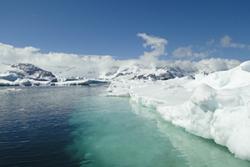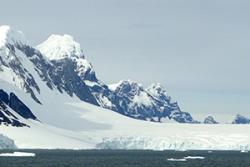Melting ice sheets will have global impact on ocean tides
 An ice sheet meets the sea: Image:Jess Mead SilvesterWhilst it is widely accepted that sea level is rising because of the melting of the massive sheets covering Greenland and Antarctica, a new paper in the Journal of Geophysical Research: Oceans, (http://onlinelibrary.wiley.com/doi/10.1002/2017JC013109/abstract), by scientists at Bangor University in collaboration with Harvard and Oregon State Universities in the US, and McGill University in Canada, shows that the impact of the melting of these ice sheets will go far beyond just changing water levels. It could have further reaching impacts on global climate.
An ice sheet meets the sea: Image:Jess Mead SilvesterWhilst it is widely accepted that sea level is rising because of the melting of the massive sheets covering Greenland and Antarctica, a new paper in the Journal of Geophysical Research: Oceans, (http://onlinelibrary.wiley.com/doi/10.1002/2017JC013109/abstract), by scientists at Bangor University in collaboration with Harvard and Oregon State Universities in the US, and McGill University in Canada, shows that the impact of the melting of these ice sheets will go far beyond just changing water levels. It could have further reaching impacts on global climate.
The new results show that sea level does not increase uniformly across the globe in response to melting of the polar ice sheets. In fact, sea level changes in response to ice loss are highly spatially variable, especially close to the retreating ice sheets. The new results, which are obtained with a numerical model of the global tides, show that the tidal changes due to ice sheet collapse and associated sea level changes will be highly variable and affect a number of different important processes.
Along some coastlines the tidal range will be greatly amplified, for example the North Walian coastline, whilst along other coastlines such as South Wales, the tidal range will be reduced. Moreover many functions of the ocean will be altered by the changes in the tides.
Lead author Dr Sophie-Berenice Wilmes, who was a PhD student at Bangor University, explained:
 Image: Jess Mead Silvester“Tides currently play a key role in sustaining the large-scale ocean currents which redistribute heat from the tropics to higher latitudes and are responsible for the mild climate in the UK. Predictions provided by the new model show that the collapse of the ice sheets will significantly impact the global tides which could in turn impact ocean current systems which are important for our climate.
Image: Jess Mead Silvester“Tides currently play a key role in sustaining the large-scale ocean currents which redistribute heat from the tropics to higher latitudes and are responsible for the mild climate in the UK. Predictions provided by the new model show that the collapse of the ice sheets will significantly impact the global tides which could in turn impact ocean current systems which are important for our climate.
The global changes in the tides will also have profound impacts on a wide range of other ocean functions, such as changes to the regions of the ocean which absorb carbon dioxide from the atmosphere, and on the ecosystems of the temperate (shallow) shelf seas surrounding the continents.”
Commenting co-author Dr Natalya Gomez of McGill University said: “The disappearance of the polar ice sheets in a warming climate would represent a profound change in the Earth system, and we are only just starting to understand the implications.”
Project supervisor Dr Mattias Green of the School of Ocean Sciences commented:
“The new results highlight the importance of considering changes in the tides, due to changes in sea level in response to ice sheet loss, in predictions of future climate and reconstructions of past global climates.”
Sophie Wilmes’ PhD was funded by Fujitsu and High Performance Computing Wales, and she now works for Oregon State University. The research was carried out with Mattias Green and Tom Rippeth at the School of Ocean Sciences, Bangor University, and Natalya Gomez at McGill University and Harriet Lau at Harvard University.
Publication date: 8 November 2017
